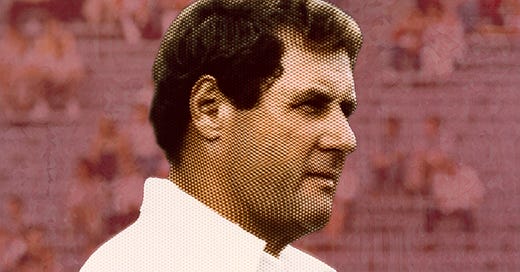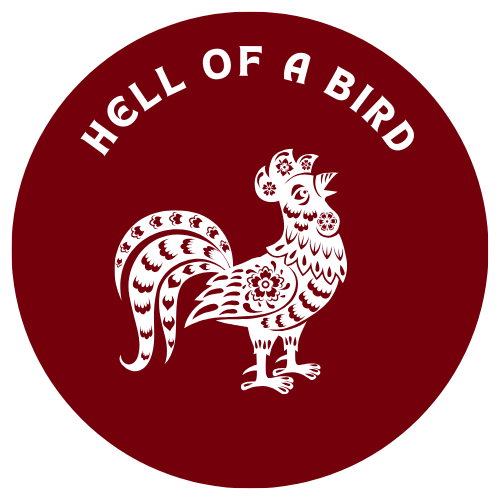James Carlen vs. the University of South Carolina
I went to the National Archives to unpack one of Gamecock Football's greatest mysteries: why, exactly, did we fire Jim Carlen? Behold Part 1 of a multi-part series.
Why did South Carolina fire Jim Carlen?
It’s a rite of passage for young USC fans to puzzle at the answer to this question — once they’ve already memorized the current two-deep and have begun immersing themselves in the program’s lore. Within seconds of finding George Rogers’ Wikipedia page, our Gamecock hatchling will inevitably discover that Rogers’ coach was fired within a calendar year of completing back-to-back 8-4 seasons and securing the school’s first and only Heisman Trophy.
How curious.
“Was the 1981 season truly such a disaster that a regime change was unavoidable?” they will wonder.
“No,” the answer echoes back across the decades, “it wasn’t.”
While it’s true that 1981 featured one of the more notorious losses in program history — a two-point home defeat to the University of the Pacific, coached by 34-year-old Bob Toledo — three of USC’s six losses were to teams that finished in the top five of the AP poll, and one one of its six wins was on the road at No. 9 North Carolina.
A good season, then? Absolutely not. And the pain of the mediocrity was made all the sharper by Clemson’s simultaneous march to a national championship — a march that included a 29-13 win at Williams-Brice during the regular season finale, which made made it five defeats for Carolina in the previous seven matchups with the Tigers.1
But nor was the 1981 season such a catastrophe that left the board of trustees with no recourse but to part ways with an otherwise successful coach.
Contemporary news sources offer little help unpacking the mystery of Carlen’s firing. With rare exceptions, reporters will merely imply the Board of Trustees’ problem with Jim Carlen without ever stating it outright. Bob Gillespie was more direct than most in his remembrance of Carlen on the occasion of his death in 2012. The tone of Gillespie’s article is one of eulogy, but even so he makes frequent use of words like “caustic,” “arrogance,” and “stubbornly.”
“Jim Carlen, to the end, believed in himself. That worked against him when his blend of bluntness and perceived arrogance with reporters, fans and USC higher-ups made him an easy target. But he always figured he knew what was best, and by his own admission stubbornly plowed ahead, regardless of consequences.” - Bob Gillespie, The State
Maybe it’s a legacy of the six years I spent adjudicating unemployment claims, but I’ve always found these explanations for Carlen’s firing to be lacking in important details. Telling us that Carlen was unpleasant to work with might explain why the board would have been predisposed toward firing him, but it doesn’t tell us much about the specific thing Carlen did to get fired.
In the parlance of my erstwhile occupation, what was the final incident that led to the claimant’s discharge? What happened that made President James Holderman and the USC board of trustees decide that enough was enough?
The good news for us is that Jim Carlen sued the university of South Carolina over his termination,2 and that lawsuit — which was settled out of court — produced myriad court records, including the sworn depositions of President Holderman, of several members of the board of trustees, and of Carlen himself.
The narrative that emerges from the depositions and court filings in Carlen vs. University of South Carolina is a strange one. The thrust of Carlen’s argument has less to do than one might expect with the fact of his having been fired or the reason for his having been fired. Rather, his focus is more squarely on the abrupt nature of his firing having caused, according to Carlen, irreparable damage to his reputation. From Carlen’s point of view, his termination came out of nowhere and was issued after receiving communication that Carlen perceived as verbal assurance that the board and the president meant to stand by him through a difficult season. Somehow this made it harder for him to find a new job, he argues.
The counter-argument made by the university was that, yes, Carlen’s reputation was damaged, but such damage was done largely by Carlen’s own hand. And the ways he damaged his own reputation tended to fall into one of four categories, which I will rank here by order of importance:
He did not work well with the administration.
He did not get along with the fans.
There were aspects of his personal life that did not go over well in the puritanical culture of Columbia, South Carolina in 1981 — in ways that would later prove to be deeply ironic.
[big gap]
The actual quality of the football team.
Some of the dings on Carlen’s reputation left a paper trail. Other incidents appear to have been mere rumors about Carlen that were circulating through the Columbia social scene.
Next time, we’ll begin unpacking some of those incidents and tease out what we do know from what we don’t.
Oh yeah — by the way — I’m back. And the newsletter has a new name.
The first person to correctly guess the precise pop culture-derived origin of the new name gets a treat.
Tame stuff to us, the survivors of losing seven in a row, but still.
Carlen’s immediate successor, Richard Bell, would also end up suing USC for wrongful termination. As would athletics director Bob Marcum, the person who was accused of wrongfully terminating Bell. Maybe Joe Morrison would have gotten in on the action too had his death not preempted his looming termination.






So excited you’re back man
Nice post.
I guess I just figred the name was a riff on that Rick James / Dave Chappelle quote about cocaine. "Gamecock is one HELL of a bird." :)